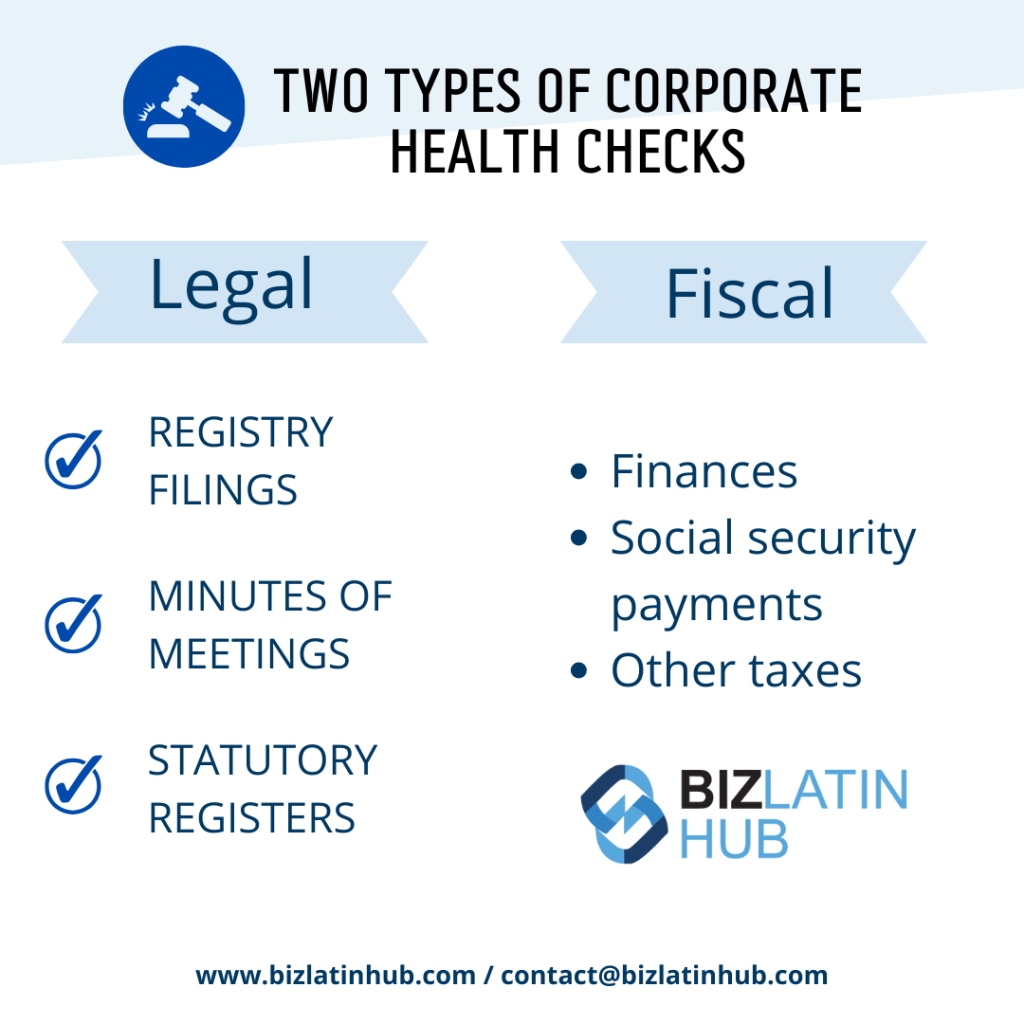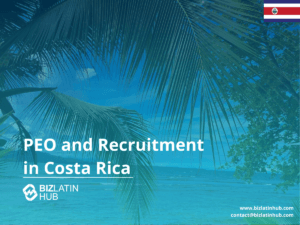Despite being the seventh-largest recipient of foreign direct investment in the world. Entity health checks are used by both large businesses as well as startups before or after company formation in Brazil. Their practicality is especially prudent in nations where corporate compliance regulation is difficult and convoluted, or where penalties for corporate misconduct are harsh. Unfortunately, Brazil qualifies on both of these accounts. With the use of corporate health checks, enter the Brazil market without the fear of non-compliance penalties.
Key Takeaways For An Entity Health Check In Brazil
| Types of entity health check in Brazil | There are two main types of entity health checks. They typically focus on either the fiscal or legal condition of the company. |
| Why carry out an entity health check in Brazil? | To enable executives to know how the business is being managed To reduce risks of penalties and negative reputation To reduce transaction risks |
| Are entity health checks in Brazil a legal necessity? | It is not a legal necessity in of itself, but it will help you make sure you are staying compliant. |
| Who conducts an entity health check in Brazil? | It should be done by a fully independent auditor to ensure total neutrality. The auditor should also be well aware of Brazilian company law. |
What are entity health checks in Brazil?
An entity health check is a voluntary audit conducted by independent contractors. This independent group is made up of legal and financial experts who are employed to open up a company to inspect possible compliance issues. By delving into corporate documents, these checks assess the company’s compliance status. Corporate health checks help companies to ensure that their actions are all clean and legal.
There are two types of corporate health check. One investigates the key areas of legal compliance: registry filings, meeting minutes and statutory registers. The other focuses more on fiscal and accounting compliance by examining the company’s balance sheet.
Health checkers go deep into business transactions, tax payments and employee salaries in order to find issues or gaps in the filings. By doing this, companies can know for certain that they will not incur penalties from authorities.
In compliance landscapes that are dotted with traps and stumbling blocks, it is very easy for companies to overlook certain regulations. Brazil is a prime example of a country with web-like legal and fiscal regulations. Without careful deliberation, penalties and fines can quickly stack up.
Fiscal entity health checks
Taxes in Brazil are levied across three different regional levels: federal, state and municipal government taxes. The federal tax is uniform for all; state and municipal tax rates, however, vary across different areas. The city of Manaos, for example, offers a lower rate than somewhere like Sao Paulo.
On gross revenue, companies pay two types of taxes. The first is federal, set at 1.65%. The second is a mandatory social security contribution, set at 7.6%. Businesses must also withhold personal income tax which is deducted from employee’s payment.
There are also two types of value-added tax (VAT) in Brazil. The first tax is a federal payment that is levied on the production and import of domestic and foreign goods. This rate is set at 20%. The second VAT is a state payment on goods as well as services known as ICMS. Dependent on the state this tax rate is set between 7-25%. Brazil’s accounting system plays host to a number of irregularities, outlined is a list of the most profound differences:
- Unlike some countries, Brazil’s tax year is January-December with tax returns required to be filed on the last working day of April.
- It is also worth noting that tax extensions are not offered in Brazil. The deadline is strict and, if missed, fines start to be implemented.
- Companies must report payroll and VAT filings to the Brazilian government every month.
Without the use of local experts to perform an entity health check, non-compliance with any of these fiscal regulations can end up in substantial fines.
Entity legal health checks in Brazil

Similar to fiscal compliance, legal compliance in Brazil is equally rigorous. Company incorporation in Brazil is twice as long as any other Latin American country, involving a number of federal boards, as well as municipal and state ratifications.
Private entities in Brazil must maintain a local registered address when operating and foreign companies must have a Brazilian legal representative as a power of attorney. Every year, companies registered in Brazil must report annual returns that confirm the relevant details of their company. These details also include updates on any changes in directors and their home addresses.
Foreign companies looking to close their company in Brazil must continue employing a full-time secretary as well as an office in the country until the lengthy liquidation process is completed. Employment law also throws up a number of compliance issues.
Employers in Brazil must provide a number of additional benefits to employees such as meal allowance, life insurance, dental allowance, pensions, medical checkups as well as annual bonuses. Accurate records for these allowances must be clearly declared in employee contracts before they start work.
Any non-compliance on any of these regulations, particularly concerning employment law, can end in court hearings, expensive legal fees, and potential fines.
Why are corporate health checks important in Brazil?
Corporate health checks act as a company’s backstop, saving them from incurring penalties and expensive fines issued by authorities. Particularly in the case of Brazil, it is not an easy task ensuring compliance, even more so for new or foreign businesses not familiar with local law. Corporate health checks are also especially prudent after a set of reforms to corporate law have been made.
For smaller businesses, it can be very easy for these changes to slip past the net. With the help of an entity health checker you can avoid this oversight. Corporate health checks are useful to any business – large or small. Nevertheless, there are three instances where they are most commonly used, during mergers and acquisitions, startups and branch office oversight.
Mergers and Acquisitions
When purchasing another company, a lot of vigilance is required. It is very easy to be distracted by the reams of bureaucracy during a company buyout. What looks ok on the surface can easily be hidden by false figures. By using an independent corporate health checker during a merger, they can investigate the balance sheets in-depth and potentially uncover strings of debt or unpaid taxes.
Mitigating the risk of an incorrect valuation can help purchasers save large sums of money and bring negotiations to a fairer agreement. In the case of Brazil where the web of corporate law is particularly dense, a thorough and diligent examination of a company is wise before a purchase.
Startups in Brazil
In the case of startups, particularly foreign-owned startups where local law is completely alien, it can be very easy for compliance regulation to overwhelm a small office. When there are countless other tasks to complete during company incorporation, it is very easy for compliance to be put to the bottom of the pile. In Brazil, where there is no leeway for non-compliance, fines can bring a startup to its knees before it has even had a chance to grow.
The act of an entity health checker coming in will advise on regulations the company is at risk of breaching or assure a business owner that his company is compliant. The road to company incorporation in Brazil is not an easy one. Bringing on all the support available will help keep the company afloat until it can support itself.
Branch office managment
As a large company with a number of branches around the world, it can be difficult to oversee all of their actions. Compounded by the fact that each branch is likely to have different laws, it is difficult for the corporate managers to keep track of each specific branch’s compliance.
To ensure performance as well as compliance, corporate health checkers can examine the conduct of branch offices and report to head offices for detailed rundowns of operations. Non-compliance can cost the company in fines, sanctions and/or a damaged business reputation. A branch office in Brazil, as many multinational companies have, can mean compliance headaches. The best method of avoiding this is to employ a corporate health checker.
FAQs on an entity health check in Brazil
1. Why should you get an entity health check?
The main advantages of conducting an entity health check include:
To enable executives to know how the business is being managed
To reduce risks of penalties and negative reputation
To reduce transaction risks
2. What steps are there to an entity health check?
Carrying out a successful entity health check involves the following 3 key steps:
1. Information collection
When carrying out an entity health check, a large amount of information will have to be gathered. This will include collecting data from your company’s operations, legal, accounting, and administrative departments.
Note that a best practice many companies are adopting is the creation of a compliance or audit department, in charge of centralizing important company information, which eases this first step.
2. Information validation
Once gathered, the information goes through a validation process. In this step, an entity health check agent will review all the data and documents obtained, cross-reference it against primary sources where necessary, and otherwise seek to prove the veracity of all records being audited.
3. Record Keeping
Records of all the documents and evaluations made during your entity health check will not only be valuable for presenting to tax authorities in case of an inspection, but also during future entity health checks. In some cases, keeping such records is a legal obligation, due to laws desiged to prevent money laundering.
3. What happens in an entity health check?
Generally, an entity health check includes:
Evaluation of finances, social security payments, and other fiscal obligations
Examination and review of contracts signed with third parties
Review of corporate and accounting books
Review of monthly tax returns and tax statements
Review of upcoming renewals of certificates and policies
Preparation of financial statements
Review of balance sheets submitted at the closure of the fiscal period
4. Who can perform an entity health check in Brazil?
It should be done by a fully independent auditor to ensure total neutrality and make sure everything is in accordance with the authorities.

Use local experts for your entity health check in Brazil
Investing in Brazil no doubt has enormous upside potential with its booming economy, strong infrastructure, business-friendly government, and cheap workforce; however, the price to pay for this comes in the form of compliance.
Large multinationals go through in-house compliance auditing every month. They simply cannot risk the penalties in fines nor reputation. Why should it be any different for smaller companies? Insulate yourself from corporate penalties by employing an entity health checker.
Biz Latin Hub provides a range of business services to in-coming foreign companies. Partner with our expert team of lawyers and accountants to help your company navigate local compliance law. If you’re interested in our Brazilian entity health checking services, get in touch today here at Biz Latin Hub and we can ensure your fiscal and legal requirements are clear of all noncompliance.
Learn more about our team and expert authors.







